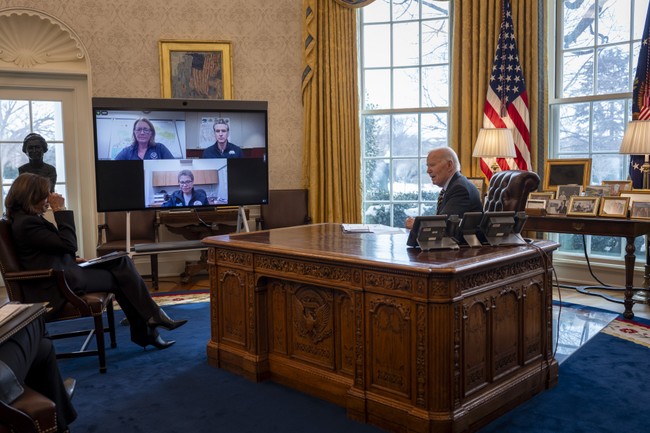From PJMedia.com

When Donald Trump is sworn in next week, America will have a president for the first time in four years.
The Biden era hasn’t been a presidency but an interregnum, with seemingly no one in charge in Washington.
Advertisement
The sign on Harry Truman’s desk used to say, “The buck stops here.”
Where did it stop with Joe Biden in the Oval Office?
Voters never asked for an experiment in leaderless administration, but the party that put Biden in power gave them one anyway.
In the 21st century, Democrats are misnamed:
They’re the less democratic of the two great parties, and their insider-dominated politics explains both how Biden wound up in a role for which he was unfit and why the candidate picked to replace him went on to lose every battleground state.
Kamala Harris had never won a presidential primary.
But the party’s mandarins first pushed her for vice president, and then they pushed Biden off the ticket and made her the nominee without giving voters the slightest say.
This isn’t a people’s party:
Bill and Hillary Clinton still believed the party belonged to them even after Barack Obama beat Mrs. Clinton for the 2008 presidential nomination.
The Clintons and Obama’s coterie subsequently agreed to power-sharing, with Hillary Clinton as President Obama’s secretary of state and all-but-officially-designated successor.
Biden was very much a junior partner in the Obama-Clinton party, and that didn’t change after the party made him its nominee in 2020.
Advertisement
Obama and Hillary Clinton kept Biden from running four years earlier. Obama wouldn’t support his own vice president because it was Hillary’s turn — that was the deal.
Trump shattered their corrupt dynastic bargain, just as he broke the hold of the Bush family and its allies on the GOP.
Trump put to the test a much-debated question in political science: Does the party decide — meaning party elites — or can voters pick a winning nominee in defiance of what the political establishment wants?
Thanks to Trump, the Republicans became a party of primary voters, while the Democrats remained under elite control.
The results are now in, and they can be seen in both Biden’s sad job performance and Harris’ humiliation at the polls.
Turning into a party of primary voters wasn’t without cost for the GOP, however, and led to the nomination of some weak candidates in the 2022 midterms and other recent contests.
Yet the price not only Democrats but the whole country paid for the anti-democratic politics of the Clintons and Obamas has been much steeper.
Democrats forfeited their future by selecting Biden and Harris five years ago — the one too senescent to serve as president, the other too unlikeable to win a national election herself.
Advertisement
The Democratic establishment — which includes Nancy Pelosi — has had a stranglehold on the party since the 1990s, as occasional challengers like Bernie Sanders, Tulsi Gabbard and Robert F. Kennedy Jr. discovered in turn.
That led Gabbard and Kennedy out of the Democratic Party’s confines and into the freer and more freewheeling coalition of Trump’s GOP.
The Democrats had actually been the first party to commit fully to the modern presidential primary system, but they were burned by the experience.
Richard Nixon won the 1968 election in part thanks to Democratic disarray: Like Biden, the incumbent president that year, Lyndon Johnson, dropped out of the race, and the party’s eventual replacement, Hubert Humphrey, was, like Harris, a vice president handed the presidential nomination without competing in a single primary.
Stung by defeat, in 1972, Democrats tried to embrace democracy by giving primaries more weight — but wound up with a candidate, George McGovern, who lost in a 49-state blowout.
Jimmy Carter, whose dismal years as president look a little brighter by contrast with the Biden-Harris interregnum, was actually the Democrats’ savior in 1976 and seemed to vindicate the wisdom of primaries.
Advertisement
But then the party lost three consecutive presidential elections in the 1980s, and after Bill Clinton restored the Democrats’ fortunes in 1992, he and his wife were determined to remain the power brokers.
Obama could have been the Democrats’ Donald Trump, the man who gave the party back to the people.
Instead he gave it back to Hillary Clinton, and after Trump trounced her, Democrats had no leaders left — just a nonfunctional Biden and an unelectable Harris.
Now that the insiders’ political machine has self-destructed, will Democrats dare trust their voters to choose a new generation of leadership — or do they fear that will only land them with the next George McGovern?
Populism can lead to better leaders, but only if a party’s primary voters aren’t already too far from America’s middle ground.
All articles possibly rephrased by AI or InfoArmed.com